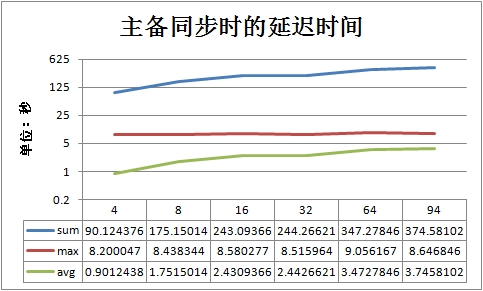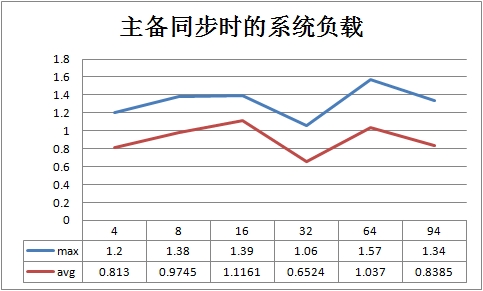标签:
PostgreSQL数据库流复制主库和备库之间的延迟时间是多少,无论对HA还是负载均衡来说都应该做个评估。比如单纯的HA架构,当主库发生故障时,我们允许多少时间内的数据丢失。不废话,直接进入本次实验测试。
主库:内存:32G,CPU:8核,IP:192.168.122.101
备库:内存:32G,CPU:8核,IP:192.168.122.102
数据库配置:默认
在两台服务器上安装好PostgreSQL数据库,安装过程不清楚的可以参考文章《PostgreSQL数据库编译安装》,网址:http://www.sijitao.net/1535.html 。
搭建数据库之间的异步流复制环境,配置过程参考文章《PostgreSQL Streaming Replication流复制环境搭建》,网址:http://www.sijitao.net/1764.html 。
重要:测试之前一定要同步下主库和备库两台服务器的时间,不然会出现延迟时间不准备的情况。
创建测试数据库和测试表,这里我用的德哥的测试模型,模拟用户登陆操作。
create table user_info (userid int, engname text, cnname text, occupation text, birthday date, signname text, email text, qq numeric, crt_time timestamp without time zone, mod_time timestamp without time zone ); create table user_session (userid int, logintime timestamp(0) without time zone, login_count bigint default 0, logouttime timestamp(0) without time zone, online_interval interval default interval ‘0‘ ); create table user_login_rec (userid int, login_time timestamp without time zone, ip inet ); create table user_logout_rec (userid int, logout_time timestamp without time zone, ip inet );
insert into user_info (userid,engname,cnname,occupation,birthday,signname,email,qq,crt_time,mod_time) select generate_series(1,2000000), ‘zhangnq‘, ‘章郎虫‘, ‘DBA‘, ‘1970-01-01‘ ,E‘我就是章郎虫。‘, ‘248687950@qq.com‘, 248687950, clock_timestamp(), NULL; insert into user_session (userid) select generate_series(1,2000000); alter table user_info add constraint pk_user_info primary key (userid); alter table user_session add constraint pk_user_session primary key (userid);
-- 模拟用户登录的函数 create or replace function f_user_login (i_userid int, OUT o_userid int, OUT o_engname text, OUT o_cnname text, OUT o_occupation text, OUT o_birthday date, OUT o_signname text, OUT o_email text, OUT o_qq numeric ) as $BODY$ declare begin select userid,engname,cnname,occupation,birthday,signname,email,qq into o_userid,o_engname,o_cnname,o_occupation,o_birthday,o_signname,o_email,o_qq from user_info where userid=i_userid; insert into user_login_rec (userid,login_time,ip) values (i_userid,now(),inet_client_addr()); update user_session set logintime=now(),login_count=login_count+1 where userid=i_userid; return; end; $BODY$ language plpgsql; -- 模拟用户退出的函数 create or replace function f_user_logout (i_userid int, OUT o_result int ) as $BODY$ declare begin insert into user_logout_rec (userid,logout_time,ip) values (i_userid,now(),inet_client_addr()); update user_session set logouttime=now(),online_interval=online_interval+(now()-logintime) where userid=i_userid; o_result := 0; return; exception when others then o_result := 1; return; end; $BODY$ language plpgsql;
\setrandom userid 1 2000000 SELECT f_user_login(:userid);
在备数据库中创建时间延迟测试的脚本,这里一起监测了备库的负载,网络流量和同步延迟时间,这里我测试了100次。
#!/bin/bash
export PATH=/opt/PostgreSQL/93/bin:$PATH
export PGDATA=/data/pgsql
export PGHOME=/opt/PostgreSQL/93
export PGPORT=5432
i=0
sql="
SELECT
CASE
WHEN pg_last_xlog_receive_location() = pg_last_xlog_replay_location() THEN 0
ELSE EXTRACT (EPOCH FROM now() - pg_last_xact_replay_timestamp())
END
AS replication_lag;"
while [ $i -lt 100 ]
do
echo -e "`/usr/bin/top -b -n 1 |sed -n ‘1p‘ |awk ‘{print +$(NF-2)}‘` | \c";echo -e `psql -t -A -c "$sql" -d zhangnq`" | \c";/usr/bin/ifstat -i eth0 -n 1 1 | awk ‘NR>2 {print $1 " KB/s"}‘
let i=$i+1
done
在主库使用pgbench对数据库施压。
pgbench -M prepared -n -r -f ./test.sql -h 127.0.0.1 -p 5432 -U postgres -c 64 -j 32 -T 300 zhangnq
同时在备库上运行流复制延迟测试脚本,记录测试后的数值。
修改pgbench的连接数和线程数后测试多次,得到类似如下的结果。
postgres@ubuntu:~$ ./pglag_time.sh 0.24 | 28.444522 | 3833.48 KB/s 0.24 | 28.442567 | 4260.23 KB/s 0.24 | 28.442438 | 4676.84 KB/s 0.3 | 0 | 5151.29 KB/s 0.3 | 28.442349 | 5439.33 KB/s ...... ......



同步延迟最大时间基本都是在8秒左右,连接并发数增大时延迟次数增加。
带宽使用使用量和连接并发数成正比关系。
系统负载在数据库连接并发数增加时没怎么变化,系统资源使用率不高。
接下来就可以优化或者可以把延迟数据添加进nagios监控了。
原文链接:http://www.sijitao.net/1860.html
参考网址:
http://blog.163.com/digoal@126/blog/static/163877040201221382150858/
https://vibhorkumar.wordpress.com/2014/05/21/monitoring-approach-for-streaming-replication-with-hot-standby-in-postgresql-9-3/
PostgreSQL数据库Streaming Replication流复制主备延迟测试
标签:
原文地址:http://my.oschina.net/u/270810/blog/365566